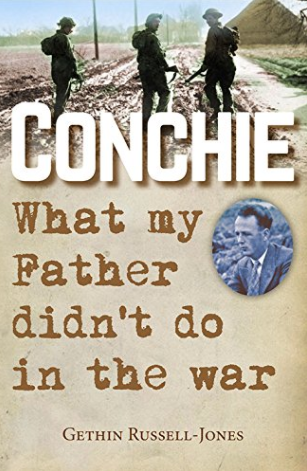Conchie: what my father didn’t do in the war
Informative and thought-provoking account from a Baptist minister's son about his father being a conscientious objector
 Conchie: What My Father Didn’t Do In The War
Conchie: What My Father Didn’t Do In The War
By Gethin Russell-Jones
Lion Books
ISBN: 978-0-7459-6854-4
Reviewed by Rosa Hunt
The subject of this book, the Revd Thomas John Russell-Jones, was a member of the church in Caerphilly where I was a student minister. On my first visit accompanying the minister to take home communion to Russell and his wife, I was astonished by the searching questions I was asked about the Hebrew that I was being taught at college.
And even more astonished when we returned a couple of months later to find that not only did Russell and Mair remember exactly who I was, but he also remembered the answers I had given him and took up the conversation about Hebrew where we had left off! So I have abiding memories of a kind, intelligent and hospitable man, who took a keen interest in the world around him despite being blind.
I therefore had a particular interest in reading his son Gethin’s account of Russell’s extraordinary life. Like us, maybe, Russell was born in interesting times, and he made the difficult decision to become a conscientious objector during the second world war.
Difficult for him, as he faced internal and external questions about his true motives.
Difficult for his parents, who had to continue to live among neighbours whose sons were fighting and facing death every day.
Difficult, perhaps, because his fiancée was working on cracking the Enigma code in the huts at Bletchley Park. And difficult for his children, who had to come to terms with the fact that their father had chosen a very different path to that of their friends’ dads.
This book is an honest and courageous attempt by a son to enter his father’s world and try to understand his motivations. It is backed up with extended extracts from diaries and other contemporary sources, and so it is also a fascinating chronicle of an evolving Wales over the course of the 20th century. Gethin explores the tensions which Christians face when trying to be faithful to Jesus and loyal to their country.
By charting his father’s theological journey he also offers us a picture of the breadth of Christian expression in Wales and elsewhere in the first half of the 20th century, and the trials and tribulations involved in qualifying and training for Baptist ministry at the time.
With my interest in Baptist ministry in Wales and my personal acquaintance with Russell, I did expect to enjoy this book, and I was certainly not disappointed. It is well-written, with a light and humorous touch. I learned a lot about Welsh chapel and cultural history from it.
However, I think this book would have a wider appeal: to anyone who is interested in the life of Christians both ordinary and extraordinary during times of great national crisis. Perhaps we too will have to face similar questions about conforming to state decrees in our own lifetimes. I would recommend this book to you as an easy, informative and thought-provoking read.
Baptist Times, 30/06/2017